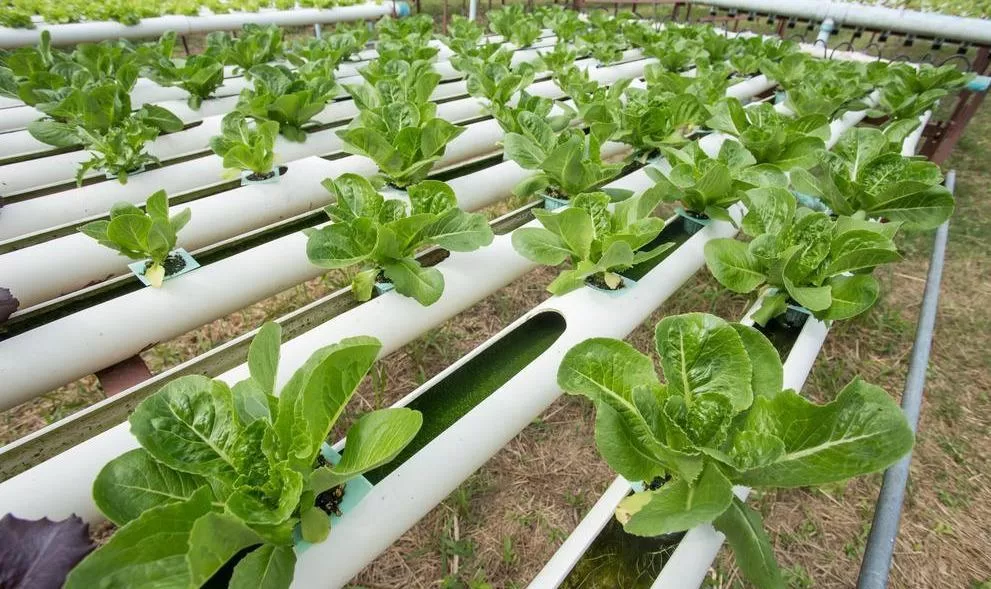Introduction: The Urban Farming Dilemma
As cities expand and arable land becomes scarce, feeding a growing urban population is an escalating challenge. Traditional farming methods struggle to meet the demands of dense urban centers, where space is limited, and resources like water and soil are in short supply. Enter hydroponics—a revolutionary farming technique that offers a sustainable, efficient, and space-saving solution to urban food production.
This article explores how hydroponics is transforming urban farming, its benefits, challenges, and the exciting future it holds for sustainable cities.
What is Hydroponics?
Hydroponics is a method of growing plants without soil, using nutrient-rich water to deliver essential minerals directly to the roots. This soil less farming technique allows plants to grow faster and with less water than traditional farming methods. By replacing soil with materials like perlite, clay pellets, or simply water, hydroponics eliminates many limitations of conventional agriculture.
Why Urban Farming Needs Hydroponics
Urban areas face unique challenges that hydroponics is uniquely positioned to address:
- Land Scarcity: With limited open spaces, traditional farming is often not feasible in cities. Hydroponics systems can be set up on rooftops, balconies, or even indoors.
- Water Efficiency: Urban farming demands water-efficient techniques, and hydroponics uses up to 90% less water than traditional agriculture.
- Year-Round Farming: Controlled environments enable year-round cultivation, unaffected by weather or seasonal changes.
Benefits of Hydroponics in Urban Agriculture
- Efficient Water Use:
Hydroponics recycles water in a closed system, reducing wastage and conserving one of the planet’s most critical resources. - Space Optimization:
Vertical hydroponic farms maximize productivity in minimal space, making them ideal for urban settings. - Pesticide-Free Farming:
Controlled environments minimize pests, reducing the need for harmful chemicals. - Sustainability:
By eliminating the need for soil and reducing transportation costs (as food can be grown locally), hydroponics significantly lowers the carbon footprint of food production. - Higher Yields:
With optimized growing conditions, hydroponics produces higher yields in a shorter time frame compared to traditional farming.
Innovative Hydroponic Techniques
Several hydroponic systems are ideal for urban farming, each with unique advantages:
- Nutrient Film Technique (NFT): A thin stream of nutrient-rich water flows over plant roots, ensuring optimal growth.
- Deep Water Culture (DWC): Plant roots are suspended in oxygenated nutrient solutions for rapid development.
- Aeroponics: Roots are misted with nutrients, maximizing oxygen exposure and water efficiency.
Real-World Success Stories
Urban centers around the world are embracing hydroponics to tackle food security:
- Singapore: Known as the “Garden City,” Singapore has adopted vertical hydroponic farms to produce fresh vegetables in limited space.
- New York City: Companies like Gotham Greens operate rooftop hydroponic farms, providing fresh produce directly to local supermarkets.
These examples highlight how hydroponics is not just a theory but a proven solution for sustainable urban farming.
Challenges and Solutions
While hydroponics offers immense potential, it’s not without challenges:
- High Initial Costs:
Setting up hydroponic systems can be expensive. However, costs are decreasing as technology advances, and many governments offer subsidies to encourage adoption. - Energy Dependency:
Indoor hydroponic farms rely on artificial lighting, which can increase energy consumption. Incorporating renewable energy sources like solar power can mitigate this issue. - Skill and Knowledge Gaps:
Hydroponic farming requires specialized knowledge, but online resources and training programs are bridging this gap.
The Future of Urban Farming with Hydroponics
The future of urban farming is bright, with hydroponics at its core. Advancements in technology, such as AI-driven monitoring systems and renewable energy integration, are making hydroponics more accessible and efficient. As cities strive for sustainability, hydroponics offers a pathway to resilient and self-sufficient urban food systems.
Hydroponics is revolutionizing urban farming, providing a sustainable and innovative solution to the challenges of growing cities. With its ability to conserve resources, maximize space, and produce fresh food locally, hydroponics is set to play a vital role in shaping the future of urban agriculture.
What do you think about the role of hydroponics in sustainable urban farming? Share your thoughts in the comments below!







